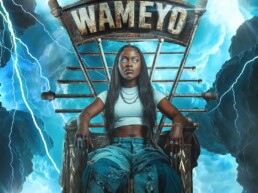In May 2018, a boy band comprising four Eastlands-based artists – Rekles, Seska, Swat, and Zilla- calling themselves Ethic, released a music video which while oddly enough recorded using a phone still went on to captivate the entire country and subsequently became a pivotal single in Kenyan music history. The music video was for a song named Lamba Lolo, derived from a kind of slapstick phrase for oral pleasure commonly used by Kenyan inner city dwellers. The song itself was characterized by aspects of Genge-rap blended with hints of dancehall and reggaetone and topped off with unfiltered and unrestrained lyrical expression. Although Lamba Lolo lacked the technical dexterity one expects from a modern-day-produced single, it served as the introduction of Gengetone, a new Kenyan-centric sound that would go on to rule the local airwaves for way more than a few months as many people initially figured.
Soon after Ethic’s emergence through Lamba Lolo and the follow-up songs they released, other underground artists started to embrace this new sound, slang and all, arguably in an attempt to mirror the success Ethic had realized. While some of them would only achieve success as one-offs, such as the artist Only One Delo with the hit song Chupa Kuchupa which, for a period was the official anthem for the genre, others would become radio playlists’ mainstay artists, gradually establishing themselves as household names and the official stars of this new genre of music.
Ochungulo Family, emerged in July 2018 — as a group consisting of artists Benzema, Dmore and Nellythegoon — who wowed Kenyans with songs such as PandemiK, Dudu and Mpenzi Mtazamaji, establishing themselves as the foremost purveyors of the new sound. Alongside them, Boondocks Gang – who rose in December 2018 comprising of Exray, Odi Muranga and Maddox – would impress with Rieng, Kidole and Thao, the last of which featured the pioneers Ethic. Sailors Gang – who came up in April 2019 comprising of Shalkido, Qoqosjuma, Masilver, Miracle Baby and Lexxy Young – would introduce the genre and sound to demographics in rural suburban areas with hits such as Wainame, Pekejeng and Wamlambez. Other successful acts in these early years of the genre (2018-2020) also included Mbogi genje -comprising of Smady, Guzman and Militan -, Kappy, Gwash and others.
These artists though were not the only ones at the forefront of pushing the new sound, as behind them were Dj’s and music outlets that appeared whose support and constant efforts all contributed towards Gengetone’s transition from a genre that was only famed because of how it aroused morbid curiosities from mainstream audiences, to a Kenyan pop-cultural phenomenon. A noteworthy case of this was the music outlet mostly active on a YouTube channel called Wanati. The collective conceptualized hit songs like Tuko Locked (featuring Dmore, Parroty, Mastar VK and Kappy). There was also Kenyan DJ Vdj Jones. He featured in songs such as Rieng (remix), featuring Kristoff and Rankaddah, and Wale Mang’aa which featured Odi Wa Muranga from Boondocks Gang, and Swat from Ethic alongside Jua Cali.
Controversy for the Old and The Rise of the New Artists
With most music genres the idyllic golden age is rarely at the beginning of it gaining some mainstream recognition. For Gengetone though one can argue it was. This is because after it’s early period of notoriety and prosperity the Gengetone name gradually started being associated with controversy instead of the fun musical sound as before.
From the beginning Gengetone artists were prolific emotion-stirrers, whether positive or negative. The pioneers of the genre Ethic were caught up in a legal battle with their manager in as early as 2018, due to disagreements over financial issues. Sailors Gang had their single Wamlambez banned by the Kenya Films Classification Board (KFCB) from being played in public spaces. The government argued that the raw lyrics imbued in Wamlambez’ composition were not conducive to a virtuous society such as ours. After overcoming this and enjoying a significant period of success the Sailors were caught up in another controversy involving their manager, and MRX Media founder, Mwalimu Rachel, in a feud that would incite a decline in the group’s reputation and fame until eventually the crew members parted ways in 2022. The Boondocks Gang members as well would part ways to pursue solo careers shortly after in 2023.
It has been argued in some quarters that Gengetone artists fail to showcase an ethical fortitude in their music as they chokingly embrace profane lyrics in lieu of the potentially 1 million other stories they could tell to depict life in Kenya. Many have termed this as the main reason why the genre, between 2020 and 2022, underwent a period of decline which coupled with the affinity to controversy that the artists seemed to have, was a deadly match. Eventually, Kenyan music fans got jaded by the profanity.
However, this bear time in the genesis of Gengetone music was when other artists such as Ssaru, Trio Mio, Fathermoh and his Mbuzi Gang crew began taking their careers seriously. It was during this time too that beloved Genge artist Mejja became a regular feature of the various Gengetone artists’ music releases such as in Shamra Shamra with Mbuzi Gang and in the remix to Trio Mio’s Cheza Kama Wewe.
The New Generation & Arbantone
The pioneering group of Gengetone artists falls into the cohort of Kenyans born between 1990 and 1999. In modern day parlance these are those we now call older-gen z/younger millennials. However, in the last two years leading up to 2023, a new generation of Gen-Z Kenyan artists, the first to be born in the age of the consumer internet (dubbed “digital natives”), have come to the stage. Among them there are those who seem ready to add more fuel to the fire of Gengetone music. These select artists apply themselves, committing to a work ethic which is slowly but steadily ensuring the genre is not only reborn but is also evolved into a permanent component of Kenyan pop culture.
2023 saw some of these artists step up and rekindle the flame of the fire that Gengetone as a genre, had begun with. Among them, Kushman, aka Pedi wa Magenge, has showcased an admirable work ethic, releasing catchy and head-bobbing singles on occasion, while collaborating with many other industry players. The versatile Lil Maina, some have argued, has helped revive the sound with such singles as Ngwai which features Danski.
And now, producers Motif Di Don and Soundkraft are serving Kenyan music fans a new iteration of the genre called Arbantone. Arbantone is characterized by heavily sampled beats and performances by these new, much younger artists such as Gody Tenor, Tipsy Gee, Spoiler and Ranzscooby.
Throughout the tumultuous journey to this point, Gengetone has withstood all challenges thrown its way, however deserving or not. Today, Gengetone is experiencing a renaissance. One fueled by nascent, younger, Kenyan artists who are innovating their own way of expression, along the way adding a new level of depth to a genre that has been accused of lacking any.
Frank Njugi
Frank Njugi is a Kenyan Writer, Page Poet, Culture Journalist and Critic. He has written for platforms such as Debunk Media, The Standard Kenya Newspaper, Sinema Focus, Afrocritik, The Cauldron,The Moveee, Africa in Dialogue, Brittle Paper, Salamander Ink Magazine and others. He tweets as @franknjugi




